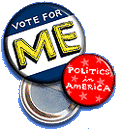
![]()
![]()
Introduction
----
How to Use
this Guide
----
Program
Descriptions
----
Previewing
Questions
----
Postviewing
Activities
----
Discussion
Questions
----
Enrichment
Activities
----
Student Page
----
Related
Resources
----
Credits
 Introduction
Introduction
Just what do you have to do to run successfully for public office in the United States?
- In her first try at public office, a North Carolina musician and television personality with no prior political experience is steeling herself for the morning's round of "money calls" to potential contributors to her congressional campaign, none of whom she's ever met.
- On the streets of Honolulu, savvy candidates for governor on down know that the best way to reach their voters is to put on a colorful lei, grab as big a sign as they can carry, stake out the corner with the busiest rush hour traffic passing by and "sign wave." And if they don't do it, they'll never get elected.
- On a Crow Indian reservation in Montana -- where one candidate for tribal leader describes local politics as cutthroat, "just like Mayor Daley's Chicago"-- winning may be determined by which candidate throws the best venison feast or has the largest extended family of voters.
- In California, a trailing gubernatorial candidate organizes a desperate 30 hour nonstop bus trip complete with 3 a.m. photo ops in a chicken parts factory, much to the disgruntlement of an exhausted press contingent. Reserved and dig-nified doesn't work in New York City politics. If you want the voters' attention, you have to literally get in their face -- for example, by commandeering the entrance to a busy subway station as streams of commuters head to work. How many "hello, how are yous?" and how much indignity one candidate can endure is a true test of political mettle.
All this and more is part of Vote for Me, the first major television series to examine America--its people, its customs, and culture--as seen through electoral politics. It is the product of three years of production and three hundred hours of footage shot in thirty states.
The central premise of the series is that politics in America is a reflection of culture: local, regional and national. For political scientists, the concept is familiar. The media's view of election campaigns, however, is quite different. Politics is generally seen as a repeating series of horse races. The culture of politics, if dealt with at all by the media, is thrown in to provide local color.
It's not hard to see why print and broadcast media are drawn to the politics-as-horse-race model. It's a compelling drama, repeated every election cycle, the kind of story that people immediately understand and are familiar with. There are two sides competing for a prize that only one can get. There are issues, ideologies, passions and lively debates. And there's usually a stirring, emotional conclusion. On election night, one candidate wins and one candidate loses. Joyous victory speeches mix with tears and sadness. This is the traditional material found in documentaries about American politics.
The challenge in filming Vote for Me was to use this inherent drama of elections to create a narrative about the culture of American politics. Every political contest that was chosen makes a different point about the practice of American electoral politics. And the progression of sequences in the film narrative, which literally hopscotches around the country, has a logic beyond traveling from one interesting political race to the next.
The broad questions raised in the film are familiar ones. Why do Americans practice "retail" politics, tailored to the individual voter at the local level, rather than a "wholesale" approach? Why does negative campaigning work? How does the electoral system and our national political culture shape the nature of political debate and discourse? What does one have to do to run for office successfully?
In a space of four hours, Vote for Me addresses these questions in a fresh way. Where else might you watch Buddy Cianci, the longtime mayor of Providence, Rhode Island, kiss a pig during his last reelection campaign? And then hear Congressman Barney Frank say, "anyone who tells you they enjoy campaigning is either a liar or a psychopath."
The film combines footage of two candidate-training sessions, one put on by the Christian Coalition and one sponsored by the Gay and Lesbian Victory Fund. These sessions show that the skills needed to win office are the same, no matter the candidates ideology. The film also tells a story of what it might be like if you or I, someone with little or no political experience, tried to run for office. Vote for Me follows the last six months of the congressional campaign of a former bluegrass singer and local television personality in Ashville, North Carolina. Viewers will watch her learn the ropes of effective politicking while attempting to run a clean campaign.
__________________________________________
by Louis Alvarez, Andrew Kolker and Paul Stekler